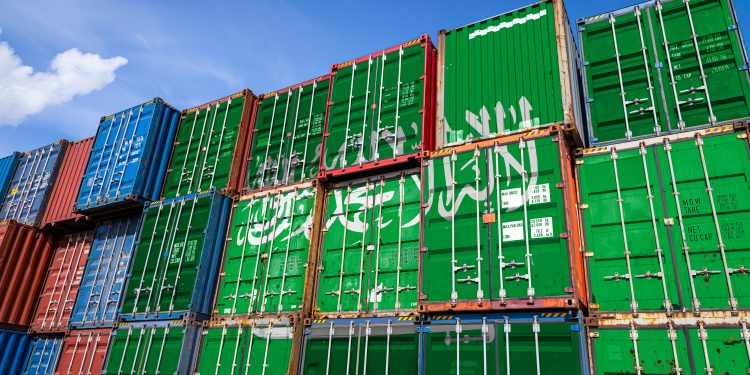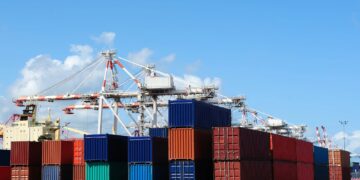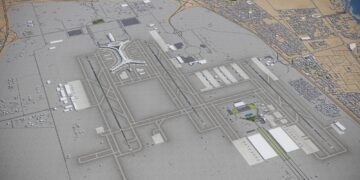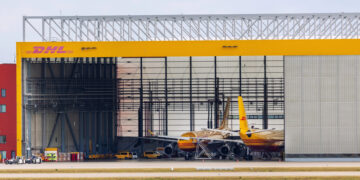International and regional corporations are positioning themselves to enter the rapidly expanding logistics market in Saudi Arabia, energized by unprecedented infrastructure investments and a burgeoning e-commerce landscape, as reported by industry experts and recent market analyses.
As industry leaders queue up, forecasts suggest the nation’s logistics market could swell to an impressive $36 billion by 2028, propelled by cutting-edge technologies like AI and IoT that enhance operational efficiency.
Major events, including Expo 2030 and the 2034 FIFA World Cup, are anticipated to further elevate the logistics sector, projecting an increase to over $41 billion by 2032, while also spotlighting Saudi Arabia’s sectoral competence internationally.
Attracted by untapped potential, strategic openings, and supportive governmental policies, global entities are gravitating towards the Saudi logistics market. Mohammed Balsharaf, the Founder and CEO of Nawel Company, a domestic frontrunner in the industry, emphasizes the nation’s strategic geographic positioning as a nexus for three continents, making it particularly appealing for the flourishing e-commerce sector.
Balsharaf credits significant state investments in upgrading ports, airports, and roadways for boosting national connectivity and efficiency, drawing further international interest. Nawel’s primary focus lies in offering storage solutions within the logistics framework.
He highlights Saudi Arabia’s modern infrastructure and conducive business milieu as key factors in attracting logistics powerhouses. Balsharaf anticipates a trend towards Public-Private Partnerships and collaborative ventures in the coming 2-4 years, aimed at augmenting infrastructure and operational adeptness.
Projected Retail Logistics Demand Surge
According to research by global consultancy RedSeer, the demand for retail logistics is set to become a pivotal factor as Saudi Arabia’s online retail market is forecasted to triple the growth rate of its offline counterpart.
RedSeer projects that the explosive growth in the logistics domain is mainly attributable to the retail market’s upsurge, which is projected to expand from $137.30 billion this year to $176 billion by 2028.
The consultancy anticipates a 7 percent annual growth rate for the industry, driven by enhancements in logistics infrastructure and a robust appetite for retail.
Accounting for 34 percent of total logistics demand, retail logistics is served by a plethora of business models throughout the first, mid, and last miles of the supply chain.
Sandeep Ganediwala, Partner at Red Seer Strategy Consultants, posits that the retail logistics market will experience substantial growth, supported by the swiftly expanding consumer retail sector. He underscores the critical and significant nature of ‘last mile’ delivery in the online logistics ecosystem, a segment absent from offline logistics.
Ganediwala points out the emergence of startups like Salasa, Sirdab, Nawel, and RedBox, which cater to the varied needs of the online logistics market through innovative business models.
Enhanced Efficiencies Elevate Saudi Arabia’s Global Logistics Standing
The logistics sector’s enhanced efficiencies, owing to vast infrastructure investments and a booming retail industry, have propelled Saudi Arabia up 17 places in the global logistics performance index, landing at 34th in 2022, up from 55th in 2018.
Balsharaf attributes this leap to key national initiatives like ‘Vision 2030’ and the ‘National Industry Strategy’, both of which focus on economic diversification and the modernization of logistic capabilities. He also credits substantial investments in ports, airports, and roadways, alongside the surge in e-commerce.
Technological advancements incorporating AI, IoT, and automation are streamlining logistics operations, fostering greater efficiency and competitiveness within the sector, Balsharaf notes.
He concludes by emphasizing the significant role domestic logistics firms, such as Nawel, play in the sector’s growth, asserting that ongoing investment and expansion will solidify their position in shaping Saudi Arabia’s retail logistics future, which will in turn contribute to the nation’s economic diversification and prosperity.









